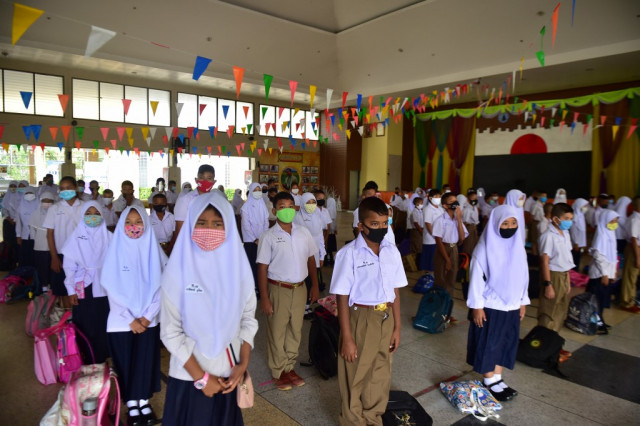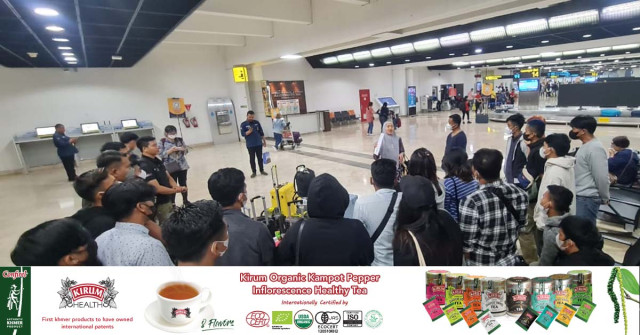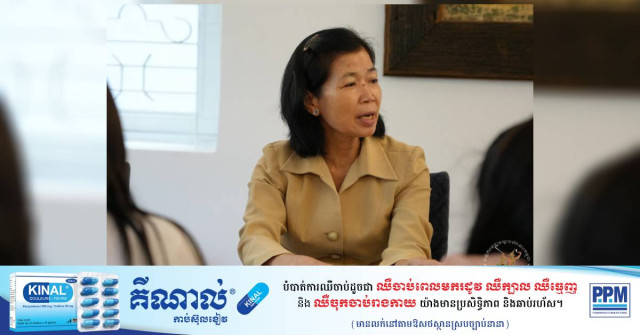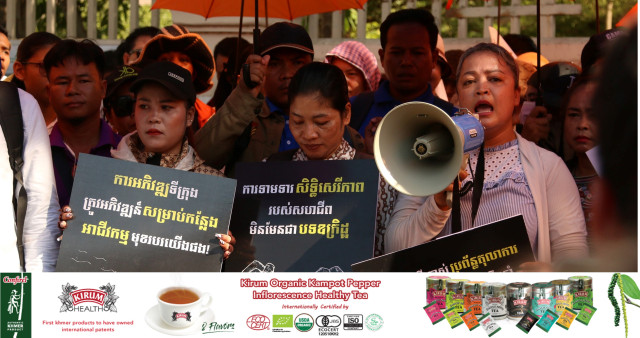Para E-Sport Player Wants to Become Role Model
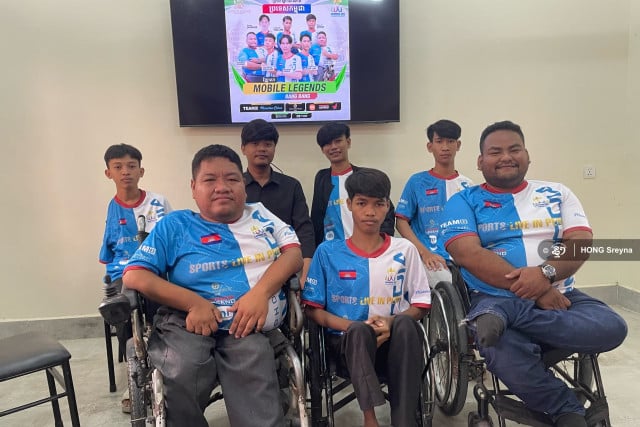
- By Hong Sreyna
- May 31, 2023 10:45 AM
PHNOM PENH – While the 12th ASEAN Para Games is about to start, Kheng Sophorn is determined to win a medal in E-Sport, to tell other disabled people to never give up.
Aged 34, Sophorn has been teaching computer science at Marist Solidarity Cambodia (MSC) – an NGO focusing on education for children with disabilities – for more than 10 years, with no intention of becoming one day a professional E-Sport player.
But when he heard that Cambodia would host the Southeast Asian Games (SEA Games) and their equivalent for disabled people, the ASEAN Para Games, he took the chance to create an E-Sport team with some of his students. They all suffer from a physical handicap: Some have withered legs, while others have paralyzed hands or fingers.
With his other teammates – Chim John, Ouk Virak Satya, Vichet Sokchea, Roeun Channy and Chuk Phea – and the team’s coach Keo Phok Sambo, Sophorn will represent Cambodia in the E-Sport’s ‘Mobile Legends: Bang Bang’ contest during the regional competition, which will start on June 3.
“[I am] really happy. I can’t find the words to describe [my feeling], I only know that I am really excited and happy,” he said. “I am excited because I am a severely disabled person who can’t move anywhere without my wheelchair. But I will be able to show my ability in the competition to play for the country’s pride.”
Born in 1989 in Banteay Meanchey province, Sophorn didn’t suffer from any handicaps in his first years. But in 1992, he reacted badly to a polio vaccine that left him unable to use his legs and his right hand.
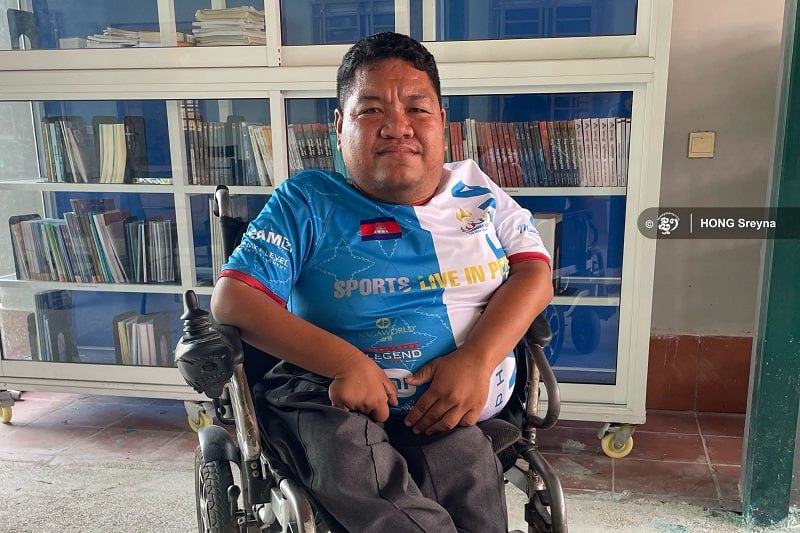 While the 12th ASEAN Para Games is about to start, Kheng Sophorn is determined to win a medal in E-Sport, to tell other disabled people to never give up. Photo: Hong Sreyna
While the 12th ASEAN Para Games is about to start, Kheng Sophorn is determined to win a medal in E-Sport, to tell other disabled people to never give up. Photo: Hong Sreyna
Following the incident, he and his family moved to Ta Khmao city, in Kandal province, to be closer to Phnom Penh.
Everything suddenly changed for him as he had lost most of his movement abilities and had to rely on his relatives for many aspects of his life. Until today, Sophorn’s childhood memories remain bitter.
“I was quite jealous of other kids who could walk and play. I also wanted to play with them but I couldn’t. I was so stressed at some point,” he said.
Instead, he was used to watching TV to stay entertained, which slowly – but surely – allowed him to learn and master English.
In 2001, Sophorn attended a general knowledge training course, where he found the motivation to develop his intellectual capacities regardless of his disabilities. Above all, he understood that he should never give up, no matter the obstacles on his path.
This new mindset made the difference, as he had had to fight against many life hurdles and people’s looking down on his condition over the years.
Cambodia’s lack of dedicated infrastructure for people with disabilities didn’t help, especially when he started to be too tall and too heavy for his family to carry him when his wheelchair couldn’t go through.
“The most challenging obstacle was after the 6th grade as there were some problems because I turned around 18 or 19 years old. People around me said I should learn a technical skill and that it was no need for me to keep studying. But I refused to let those words influence my path,” he said.
“When I became too heavy for [my relatives] to carry [me], they sarcastically said ‘when I drop out…’ or ‘when I die…,” he added, citing the hurtful speeches he had received his entire life, with no other solution to gently smile back while taking the blow.
It was not until 2007, when he was accepted at the Marist Solidarity Cambodia (MSC), that things changed. He could finally study in a suitable school where he could perfect his English and learn computer skills, considering that he would need it as a basis for his career in the future.
He, then, was chosen to be a computer teacher at the organization after the previous teacher’s resignation.
From amateur to professional player
Since the constitution of Cambodia’s ASEAN Para Game team, Sophorn had to scale up his gaming skills.
Every day, at lunch break, he and the other five members of the team gather around a table and use their best gaming device – their smartphone – to be as ready as possible for the contest.
Once their smartphone is placed in the right position, they use their movable fingers on their Xiamoi’s screens to control the game’s characters.
The six Para athletes have been familiar with the sports game for a while as they used to play it when they were bored at home or at school.
 Kheng Sophorn and his computer students at the Marist Solidarity Cambodia (MSC). Photo: Provided
Kheng Sophorn and his computer students at the Marist Solidarity Cambodia (MSC). Photo: Provided
But the pressure of competing in a regional contest changed everything: In a matter of months, they had to become professional para players.
“The first few days were a bit difficult, but then I kept trying, thinking that I had to do it and that I should not give it up,” said Sophorn.
Above all, the team wants to take the chance of competing in the ASEAN Para Games to carry a message of hope and support to every person with a disability and para athletes.
“I want people to know that, despite the fact that I am disabled, I have the same ability as those who can walk. Everyone should not be discouraged,” Sophorn added.
While he knows that he has been lucky to meet great people who have been supporting him, he also knows that setting role models can inspire other people with disabilities to follow their dreams and have ambition.
“I feel that my hard work was worth it. If I had given up, I would have failed in everything and I would have become a beggar or just stayed at home. But, I teach students these days, and many people listen to me, so I am proud of myself,” he said.
“Disabilities are sometimes seen as something bad in some people’s eyes. Some like us, some don’t. Some even imitate or insult us in jest. However, we must remember that if we highly value ourselves, the world will also think highly of us. The hurtful words are like water flowing through our ears: if it’s polluted, it should flow from one side to the other,” he said.
“I want all of you [people with disabilities] to be strong. Don’t give up on your dreams and live a meaningless life. Look for the good paths,” he added.
Originally written in Khmer for ThmeyThmey, this story was translated by Meng Seavmey for Cambodianess.






